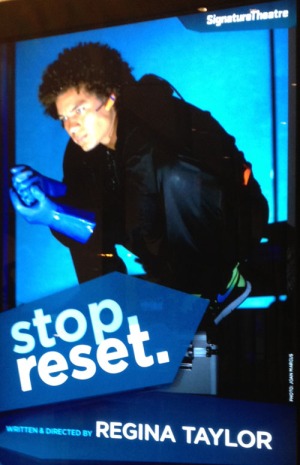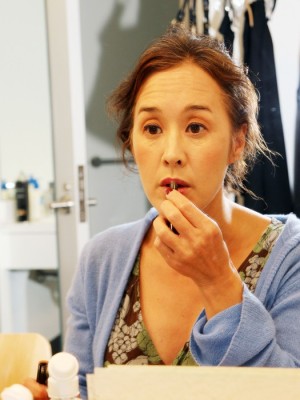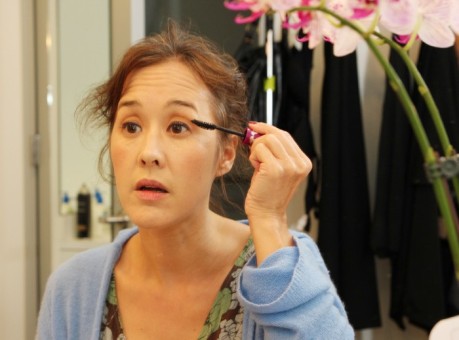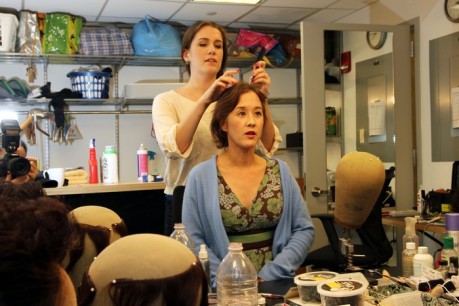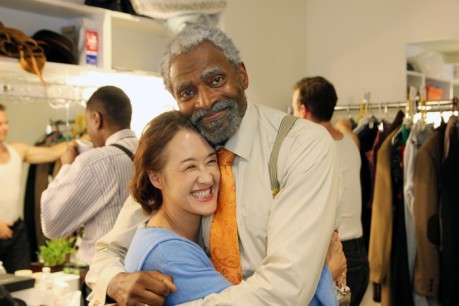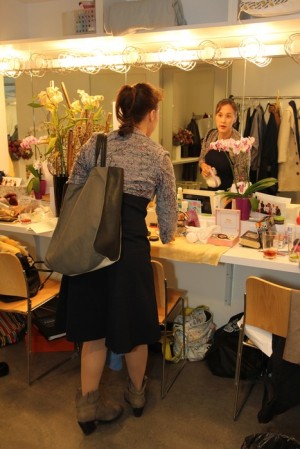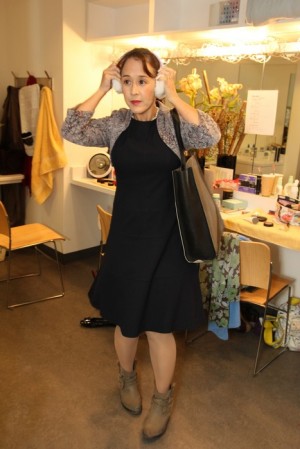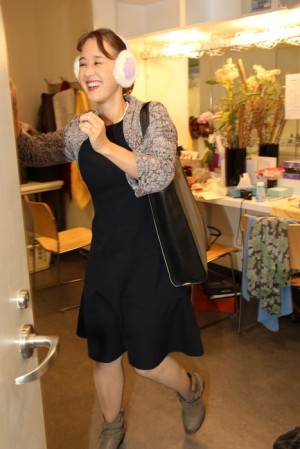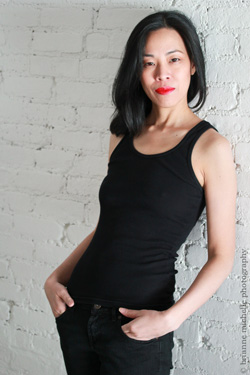Actress Michi Barall is in the ensemble cast of stop.reset. a new play by Regina Taylor
New York City
stop. reset., a new play written and directed by Regina Taylor which has performances in The Romulus Linney Courtyard Theatre at The Pershing Square Signature Center in New York through September 29, 2013, tackles powerful questions of legacy, identity and survival in a world where the real and the virtual are more closely tied than we think.

Photo by Joan Marcus of Teagle F Bougere as Chris, LaTanya Richardson Jackson as Jan, Donald Sage Mackay as Tim and Michi Barall as Deb in Signature Theatre’s world premiere of Regina Taylor’s stop. reset.
In stop.reset., e-books are outselling printed books, and Alex Ames (Carl Lumbly), the owner of Chicago’s oldest African American book publishing company, is faced with the task of questioning each of his employees, Deb (Michi Barall), Chris (Teagle Bougere), Jan (LaTanya Richardson Jackson) and Tim (Donald Sage MacKay), to determine who is still relevant in a rapidly changing world. When he meets J (Ismael Cruz Cordova), a mysterious youth plugged into the future, Mr. Ames is forced to discover just how far he will go to survive.
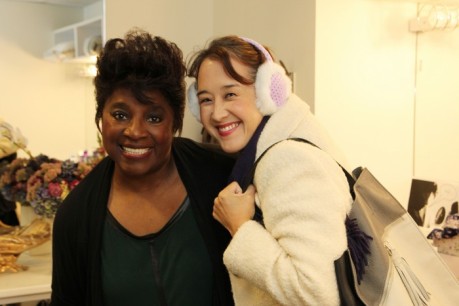
Photo by Lia Chang of castmembers LaTanya Richardson Jackson and Michi Barall starring in Regina Taylor’s stop. reset. on September 21, 2013.
Signature alum Michi Barall, and member of the ensemble cast of stop.reset. is a native of Toronto, is an actor, playwright, professor and scholar-in-training. She last starred at Signature at The Peter Norton Space in the world premiere of Queens Boulevard (the musical) by 2007-2008 Playwright-in-Residence Charles Mee, her husband of ten years.
As an actor, Michi has worked predominantly on new plays by American writers –including Julia Cho, Philip Kan Gotanda, A.R. Gurney, John Guare, Naomi Iizuka, Han Ong, Jose Rivera, Sung Rno, Paul Rudnick, Charles Mee, Sarah Schulman, Anna Deavere Smith, Diana Son, Doug Wright, and Chay Yew. Her film and TV credits include Weekends at Bellevue, I Will Avenge You Iago, Personal Velocity, Pursuit of Happiness, “Law and Order,” “Cosby,” “One Life to Live,” “As the World Turns” and co-starring as Dr. Fox on Fox’s “New Amsterdam”.
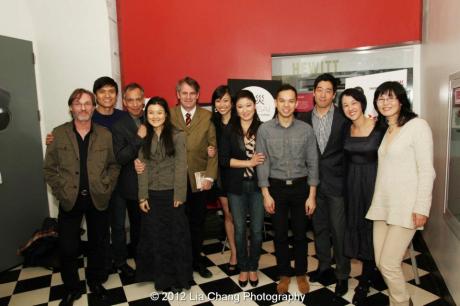
Photo by Lia Chang of Richard Thomas, Paolo Montalban, Thom Sesma, Olivia Oguma, Barlett Sher, Angela Lin, Jennifer Lim, Jon Norman Schneider, Peter Kim, Michi Barall and Kumiko Shinohara at Shinsai: Theatres for Japan, a benefit commemorating the devastating earthquake that struck the country one year ago, was presented March 11, 2012, at the Great Hall at Cooper Union in New York.
A graduate of Stanford University and NYU’s Grad Acting, Michi is currently pursuing her PhD in Theatre/English & Comp Lit at Columbia University. She is the recipient of numerous fellowships, awards and commissions including the Eleanor Prosser Prize for Academic and Artistic Excellence in Theater, Stanford University (1993), a Dramalogue Award, (1996), a Professional development grant for graduates of MFA Acting programs (1999), a Fox Fellowship Grant (2006), a Vera Mowry Roberts Graduate Fellowship, Hunter College, (2006), a John Golden Incentive Award, Playwriting, Hunter College, (2007 & 2008), a Fluid Motion Theatre and Film Commission (2008), Lark Play Development Center, Fellow (2009-2010), and a Columbia University, Graduate School of the Arts and Sciences, English and Comparative Literature Fellowship.
I caught up with Michi in her dressing room before her Saturday evening show to talk about working with Regina Taylor, multiculturalism, issues of race and racial identity, how she balances her life as an Asian American in the arts, in academia, and at home with her husband, playwright Charles Mee and their daughter Josie, who they adopted from China.
Lia: What was your first professional job?
Michi: Michael Greif hired me right out of school. It was Diana Son’s play Boy. Michael was so sweet. He called me after the audition and said, “I want to do the nude scene nude.” I said, “Okay.” He said rehearsal starts whenever. I said, “Oh, it’s just that I have to graduate the next day…” He held rehearsal so that I could graduate with my class. I was so lucky. I think that is still one of my favorite jobs. I think then I did Chiori Miyagawa’s FireDance at the Connelly Center in 1997, and then I went back to La Jolla and did School for Wives translated by the late Paul Schmidt (one of my heroes) with Tom McGowan. and then it is sort of a blur.
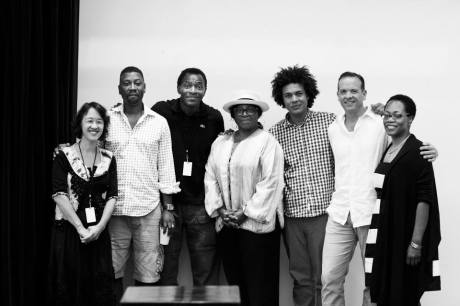
Photo by Gregory Costanzo of Michi Barall, Teagle F. Bougere, Carl Lumbly, LaTanya Richardson, Ismael Cruz Cordova, Donald Sage MacKay and Regina Taylor in rehearsal for stop. reset.
Lia: Did you know Regina before? Were you familiar with her work?
Michi: I knew Crowns and loved it. I didn’t actually know her work as an actor. I had been told that she was a wonderful actress. I was amazed that she was an actor, writer, director. I thought, wow, she’s doing it all. In stop.reset, I so much admired how she was writing this meditation about race in a speculative context, and I also loved that she had this funny office politics drama running at the same time. It’s been so great to be part of this project. Everyone is extraordinarily generous and smart and funny and supportive. I’ve been working mostly academically, and I’ve been fairly isolated. There’s a community here: it feels like this stream of people coming and going.
Lia: Where were you born and raised?
Michi: I was born in Toronto, Canada. We have official multiculturalism in Canada. For some people it seems like a very open system. For others, it feels like the official version of ghettos: everyone is their own enclave.
Lia: How did you make your way to Stanford?
Michi: I went there for undergrad. Toronto is a very multicultural city, but for me, moving to California, being among so many Asian Americans for the first time, that was the beginning of a certain kind of racial consciousness. I remember coming home and saying I was Asian American, and my dad was like, “What is that?”
My parents were migrants. Something deep and big has to happen before you move. My mom was almost 30 when she left Japan. My dad was in his twenties when he left. For me, the big move was to leave Canada and to come to the U.S. and be an artist. I look back now and think, what a crazy decision. But they were also role-models for me because I didn’t think twice about moving across borders.
Lia: Were you in brother and sister mode at Stanford?
Michi: Maybe a little bit. In a way. I think we were in that mode because we were pushing to change the core curriculum. It was the beginning of the 90s — there were sit ins in the dean’s office. There was this whole movement to change the curriculum to go beyond dead white men, to reflect the contributions of people of color, and also women.That was really powerful for me. When I first read this play, I was really excited to see that Regina was dealing with issues of race and racial identity across racial lines, in this very complicated way. Being in the play reminds me of the conversations I started having over 20 years ago.
Lia: Tell me about your character in stop.reset.
Michi: I play Deb. I like to think of Deb as a marketing executive, but I don’t think she has that title. She is in marketing, at a publishing company, an African American book publishing company.
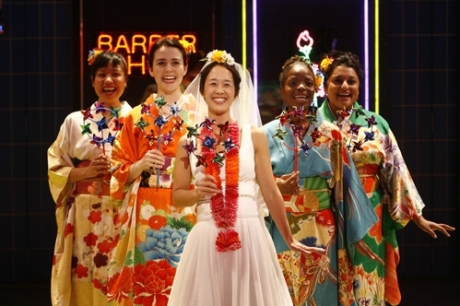
Photo by Carol Resegg (L-R) Jodi Lin, Emily Donahoe, Michi Barall, Marsha Stephanie Blake and Geeta Citygirl in Signature Theatre Company’s world premiere production of Queens Boulevard (the musical) by 2007-2008 Playwright-in-Residence Charles Mee, directed by Davis McCallum, and choreographed by Peter Pucci at The Peter Norton Space in New York.
Lia: When were you last at Signature?
Michi: It was in Chuck’s season in 2007. It was before we had our daughter and it was in the old space. Queens Boulevard was such a happy time and a fun show. Almost all the women in that photo from the show became moms soon after: me, Emily Donahoe, Marsha Stephanie Blake, GeetyCitygirl. I look at the photo and that’s what I think about – it’s the show, but it’s also like a snapshot from our pre-mom lives. It’s been hard balancing being a mom. I imagined it would be hard, but I’d forgotten how much energy it takes to perform. I go home and need to do other things, but I need time to unwind and not do anything for a while. But even though there’s no balance, I wouldn’t trade being Josie’s mom for anything.
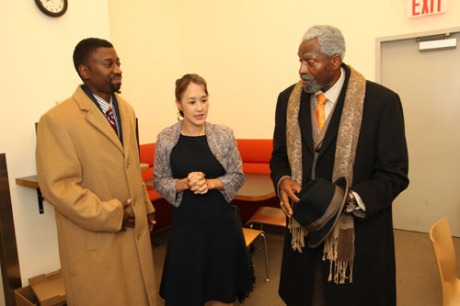
Photo by Lia Chang of Teagle F. Bougere, Michi Barall and Carl Lumbly backstage at The Romulus Linney for Regina Taylor’s stop. reset. on September 21, 2013.
Lia: What is it like to come back to Signature?
Michi: Signature goes out of its way to make itself a home to all of the people who have worked here. We feel like– when Chuck and I come here — we feel like it is a home base. When we see shows, we see our friends. And alumni night especially makes you feel like you are part of this larger community that keeps coming back, which is super fun. Getting to work here again, I feel really lucky. The new space is so dynamic— it’s nice to have interactions with other casts and have the open space and the cafe. Everybody who works here is awesome, really incredibly supportive. And Jim is around, which is amazing, especially given how much he does. And working with Regina has been such a rich experience — I’ve really admired how much she is able to make a distinction between her roles writing and directing. I don’t think I could have done that. I think I would have been more muddled. Even though it is common in contemporary Japanese theatre –there are alot of playwright/directors –we don’t see it so much here.
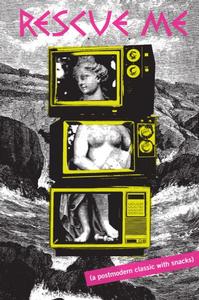
Ma-Yi presented the world premiere of Michi Barall’s Rescue Me, a dance-theatre adaptation of Euripides’ Iphigenia in Tauris at the Ohio Theater in New York in March, 2010.
Lia: You are an actor and have authored three plays, including Ma-Yi Theatre Company’s production of Rescue Me, which was produced at the Ohio Theatre in 2010. Have you ever wanted to direct?
Michi: I don’t really like being responsible to that degree. I remember, it was Kate Whoriskey, she said she did this show at Bard and she was watching some set piece malfunction, and she said that as a director, if something goes wrong like that, you can’t help but feel that it’s your fault. I think I prefer being in roles where I don’t have as much responsibility.
Lia: What are you teaching at Columbia?
Michi: I teach University Writing, which is basically freshman composition. I teach the course to international students this year: they are college freshman who have come from all over the world and are amazingly accomplished. It’s a course in academic writing, but for me, it’s really about process and drafting. They have 4 essays to write. For each essay, they have to write 3 full drafts. They just finished their exploratory drafts. Even though they’d been told, they asked if they really had to rewrite the draft. I said yes, there’s basically a whole new version due Monday. It’s been good training for me as a writer, to remind myself how much of the writing process needs to be about revision. I see it in my students, and I see it in myself, how much we really want to hang on to what’s already been written, even though it’s often in the way of more complicated insights or a more reader-friendly approach.
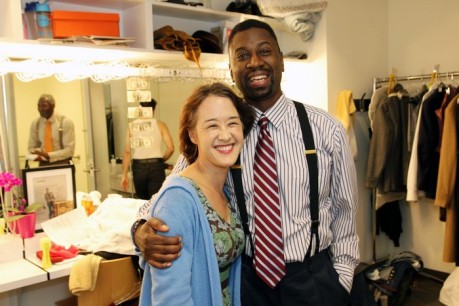
Photo by Lia chang of Michi Barall and Teagle F. Bougere in costumes by Karen Perry backstage at The Romulus Linney for Regina Taylor’s stop. reset. on September 21, 2013.
Lia: How long have you been teaching at Columbia?
Michi: The teaching is part of my package; it’s part of the PhD funding. Before teaching this course, I TA’d a modern drama course and a class on American Literature. The literature course was really useful for me, because I hadn’t really done a survey of American literature. It was taught by a woman named Wen Jin, a scholar who was at Columbia and is now at Fudan University, her alma mater. She works on U.S. and Chinese multiculturalisms, so it was also really interesting getting to know her and her work.
I find it hard to teach and write at the same time, so I am behind schedule for my own dissertation. I get derailed by life, but I often have ideas for plays. And then I also got started working on this project, trying to help put together readings of contemporary Chinese plays, in part because I built this orals exam list on modern East Asian drama. I started with the idea that I wanted to work on globalization and theater and my advisors said maybe you should do an historical survey where you start by looking at intercultural theater. Almost all the literature on intercultural theater in the US is about people like Artaud, Brecht, Meyerhold, Peter Brook, Mnouschkine — western artists who have created theater using their understanding of Asian theatrical practices. I wanted to reverse that gaze. There is a whole literature out there — modern and contemporary non-Western theatre — that emerges out of a political and theatrical encounter with the West. I had read very little of it. I knew some Japanese plays because Yoko Shioya at the Japan Society is so good about bringing stuff. But when I started to look for contemporary Chinese plays in translation, there were so few published and so few translations for the stage. I thought this is crazy, we should have access to the plays. We should be able to hear these plays. I think it is starting to happen now. David Henry Hwang brought four plays last year through the Signature and that was incredibly exciting. There are many people out there who are excellent translators, like Claire Conceison. I’m not a translator, although I wish I could do that kind of work. that’s maybe a project for another lifetime.
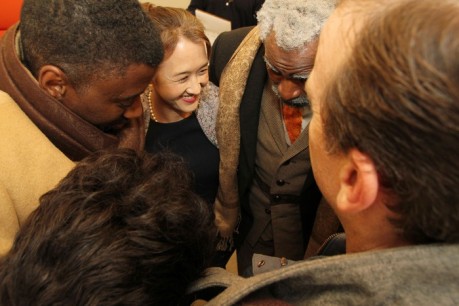
Photo by Lia Chang of the cast of Regina Taylor’s stop. reset. during their prayer circle backstage at The Romulus Linney on September 21, 2013.
Lia: How did you make the transition from actor to playwright?
Michi: I had an idea for this piece that I wanted to work on. I asked Chuck if he would write it, and he said no. I’d never written a play. I don’t know why I had the audacity to think I could. I’ve been struggling with my work since then. I have these two plays I’m working on now, one about transnational surrogacy –surrogates in India who carry babies for foreigners — and one about the global factory in China. These are plays that have naturalistic scenes, but are also set in an explicitly theatrical context that’s non-naturalistic.That’s one of the interesting things about Regina’s play- what happens when you try to incorporate and work with different genres and styles. At my most ambitious, I want to make plays like Robert Lepage makes plays. But who can make theatre like Lepage? Still, after I make a little more progress with my dissertation, I’d like to go back to writing for the theatre.
Performances for Regina Taylor’s stop. reset. continue through September 29, 2013. Purchase Tickets
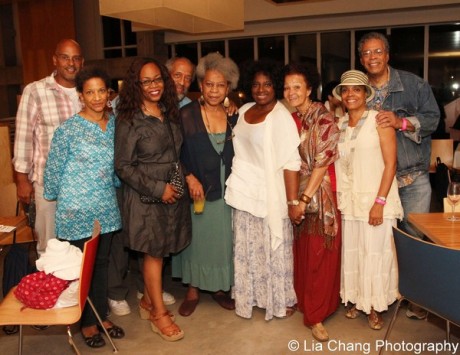
Photo by Lia Chang of Seret Scott, Regina Taylor, Arthur French, Novella Nelson Latanya Richardson Jackson, Lizan Mitchell, Denise Burse and
Charles Turner at The Pershing Square Signature Center in New York after an alumni performance of stop.reset. on August 25, 2013.
Lia Chang is an actor, a performance and fine art botanical photographer, and an award-winning multi-platform journalist. Lia recently starred as Carole Barbara in Lorey Hayes’ Power Play at the National Black Theatre Festival in Winston-Salem, N.C., with Pauletta Pearson Washington, Roscoe Orman, Lorey Hayes, Marcus Naylor and Phynjuar.
- Tags: African American Artists, Anna Deavere Smith, Asian American Artists, A_R_Gurney, Backstage Pass with Lia Chang, Carl Lumbly, Charles Mee, Chay Yew, Columbia, Crowns, Diana Son, Donald Sage MacKay, Doug Wright, Entertainment, Han Ong, Ismael Cruz Cordova, John Guare, Jose Rivera, Julia Cho, LaTanya Richardson, Lia Chang, Michael Greif, Michi Barall, naomi iizuka, NYU, Paul Rudnick, Philip Kan Gotanda, Regina Taylor, Rescue Me, Robert LePage, Sarah Schulman, Signature Theatre, Stanford, stop_ reset_, Sung Rno, Teagle Bougere, The Romulus Linney Courtyard Theatre, Theater, Toronto


